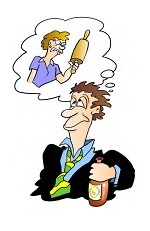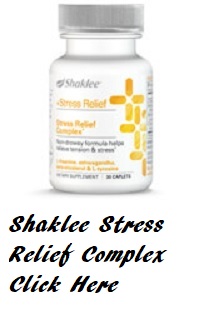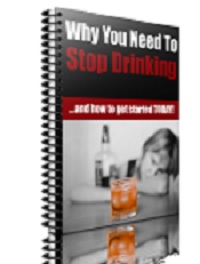The Relationship Between Stress and Alcohol
Remarks such as "He (or She) drove me to drink" were once pretty common.
Generally, a remark like this meant that we assumed that stress induces people to consume alcohol.
 While it certainly can be true that stress can be a factor in someone's decision to drink, it's important to remember that the opposite is perhaps even more true...heavy alcohol onsumption causes stress. While it certainly can be true that stress can be a factor in someone's decision to drink, it's important to remember that the opposite is perhaps even more true...heavy alcohol onsumption causes stress.
In a world where science proves to us that moderate alcohol intake can have beneficial effects on health, it's a little confusing to put everything in perspective. After all research suggests that small amounts can even improve mental functioning and increase performance in problem solving while stressed. Red wine contains resveratrol, a potent antioxidant with many valuable health aspects.
Having accepted that, however, there are also studies that demonstrate pretty conclusively that large quantities of alcohol, particularly when consumed for long periods, will actually worsen stress.
How does this happen?
 Most commonly, extensive alcohol consumption stimulates the hypothalamus, the pituitary gland and the adrenal glands. One result is an increase in the amount of cortisol produced within the body. Another is an increase in adrenaline. Both those compounds alone do not cause stress, but, they DO play a large role in the symptoms. Most commonly, extensive alcohol consumption stimulates the hypothalamus, the pituitary gland and the adrenal glands. One result is an increase in the amount of cortisol produced within the body. Another is an increase in adrenaline. Both those compounds alone do not cause stress, but, they DO play a large role in the symptoms.
Difficulty Concentrating
Extreme stress can make it more difficult to concentrate.
One of the obvious effects of heavy alcohol use is that it produces the exact same effect. Thus, heavy drinkers get a double whammy just at the moment they really need to have mental clarity the most.
Akin to ADHD/ADD
There are other studies which suggest that chronic drinkers have symptoms similar to those seen in children, and adults, with ADHD (Attention Deficit Hyperactivity Disorder). Children of those drinkers, this research concludes, have a higher incidence of actual ADHD.
In fact, excessive use of alcohol is often a symptom of ADHD in adults.
It may also be true that, as much as the stress of parenting may lead to drinking, adult drinking may encourage the circumstances that incentivize the parent to drink. It may also be a factor in producing children's symptoms that lead to adult stress in later life.
Alcohol, Exercise, and Stress
Exercise is an excellent way to help relieve the symptoms of stress. Unfortunately, one of the additional results of excessive alcohol consumption is a tendency to get less exercise. Few inebriated people want to go a few rounds on the weight machine. Also, alcohol and exercise simply do not mix. Use of alcohol interferes with the beneficial effects of exercise.
 At the same time, high alcohol intake suppresses appetite. Thus, the chronic, and stressed, alcohol user is knocking back alcoholic drinks which are high in calories, they also decrease the incentive to maintain a healthy diet. After all, there are not that many hardcore drunks who go out of their way to eat regular, nutritionally balanced meals. At the same time, high alcohol intake suppresses appetite. Thus, the chronic, and stressed, alcohol user is knocking back alcoholic drinks which are high in calories, they also decrease the incentive to maintain a healthy diet. After all, there are not that many hardcore drunks who go out of their way to eat regular, nutritionally balanced meals.
As it happens, by the way, proper nutrition can help reduce both the symptoms of stress, and the bad effects that these symptoms have on overall health.
Once again the drinker experiences a doubly negative reinforcing effect.
Money, Stress, And Alcohol
People with money problems, who drink excessively to escape stress, find it more difficult to cope with the problem that caused the stress in the first place. Even such simple tasks as balancing a checkbook are clearly more difficult when drunk. But, beyond such minor details, the cognitive functions needed to develop long term strategies to get out of debt and manage money are impaired.
If you think about it objectively, alcohol and stress are not a good combination if for no other reason than drinkers literally can't think their way out of the problems causing the stress.
In all these cases there is a vicious cycle established.
Stress encourages heavy drinking, which, in turn, makes it more difficult to deal with the internal and external factors that led to that stress in the first place. Though the specific numbers will vary from person to person, when the average individual drinks more than two or three shots of whiskey, or the equivalent, per day, the results are inevitably bad.
The key to breaking this vicious cycle is to seek alternative methods for dealing with stress. Both the symptoms and the underlying motivators are subject to change in almost all cases. Regular exercise and proper diet make a good beginning. Disciplines such as yoga, and meditation can be of value in managing stress, while having a realistic attitude about life's inherent challenges can go a long way, as well.
As with just about any other psychological problem, however, admitting that the problem exists is the first necessary step to breaking the bond between alcohol and stress in your life.
OTHER ARTICLES ON STRESS:
Return to NoDiet4Me.com
|
Alcohol and Stress
Page Updated 9:51 AM Monday, September 28, 2020
Web Page Copyright 2020 by Donovan Baldwin
|
 While it certainly can be true that stress can be a factor in someone's decision to drink, it's important to remember that the opposite is perhaps even more true...heavy alcohol onsumption causes stress.
While it certainly can be true that stress can be a factor in someone's decision to drink, it's important to remember that the opposite is perhaps even more true...heavy alcohol onsumption causes stress.
